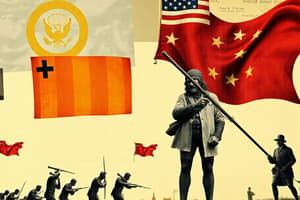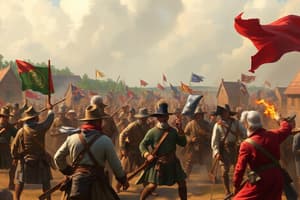Podcast
Questions and Answers
What significant outcome resulted from the Battle of Saratoga?
What significant outcome resulted from the Battle of Saratoga?
- It convinced France to provide military support to the colonies. (correct)
- It resulted in a peace treaty between the colonies and Britain.
- It marked the end of major battles in the Revolutionary War.
- It led to the British gaining control of New York.
Which event marked the surrender that effectively ended major fighting in the Revolutionary War?
Which event marked the surrender that effectively ended major fighting in the Revolutionary War?
- The Battle of Saratoga
- The Boston Tea Party
- The First Continental Congress
- The Siege of Yorktown (correct)
What was a key effect of the Treaty of Paris (1783)?
What was a key effect of the Treaty of Paris (1783)?
- It formally recognized American independence. (correct)
- It increased British territorial claims in North America.
- It mandated the return of Native American lands to their tribes.
- It established Canada as a British colony.
How did the ideals of freedom discussed during the Revolutionary era affect the institution of slavery?
How did the ideals of freedom discussed during the Revolutionary era affect the institution of slavery?
What role did international support play in the Revolutionary War?
What role did international support play in the Revolutionary War?
Which event was primarily responsible for the shift in British colonial policies that led to increased taxation in the colonies?
Which event was primarily responsible for the shift in British colonial policies that led to increased taxation in the colonies?
What was the primary slogan used by colonists to express their opposition to British taxation?
What was the primary slogan used by colonists to express their opposition to British taxation?
What significant action did the First Continental Congress undertake in 1774?
What significant action did the First Continental Congress undertake in 1774?
Which Enlightenment thinker heavily influenced American revolutionary thought regarding the 'Rights of Man'?
Which Enlightenment thinker heavily influenced American revolutionary thought regarding the 'Rights of Man'?
What role did African Americans play during the Revolutionary War?
What role did African Americans play during the Revolutionary War?
Which battle marked the first military engagements of the Revolutionary War?
Which battle marked the first military engagements of the Revolutionary War?
What was a significant outcome of the Treaty of Paris (1763)?
What was a significant outcome of the Treaty of Paris (1763)?
How did George Washington contribute to the Revolutionary War effort?
How did George Washington contribute to the Revolutionary War effort?
Study Notes
Preludes to Revolution
- The French and Indian War (1754-1763) saw Britain and France fight for control of North America, with their respective Native American allies. The war set the stage for British policies that would alienate the colonies.
- The Treaty of Paris (1763) concluded the French and Indian War, leaving Britain in control of vast territories but burdened with significant war debts, prompting increased taxes in the colonies.
- The Proclamation Line of 1763 was established by the British to prevent conflict with Native Americans by halting colonial expansion westward. Many colonists who sought to move into these lands were highly frustrated by the Proclamation Line
- The Sugar Act, Stamp Act, and Townshend Acts were all passed by the British Parliament in an attempt to raise revenue from the colonies. These acts were met with strong resistance from colonists
- "No taxation without representation" became a powerful slogan, summarizing colonists' demand for political representation in the British Parliament.
The Revolution in the Minds of the People
- Colonial protests in major seaports like Boston played a pivotal role in radicalizing the movement against British rule. Events like the Boston Massacre and Boston Tea Party intensified tensions.
- The First Continental Congress (1774) was a gathering of colonial leaders in response to the Intolerable Acts, marked the beginning of a coordinated colonial resistance to British rule.
- The “Rights of Man” - emphasizing individual liberty, property, and self-governance - gained momentum with strong influence from Enlightenment thinkers like John Locke. This influenced American revolutionary thought.
War for Independence
- The Battles of Lexington and Concord (1775) marked the first military engagements of the Revolutionary War, initiating a period of open conflict.
- The Declaration of Independence (1776) was drafted mainly by Thomas Jefferson. It formally declared the colonies' independence from Britain and articulated the philosophical basis for their revolution.
- Both free and enslaved African Americans fought on both sides of the Revolution. The British offered enslaved people freedom if they joined their cause.
- George Washington's leadership proved vital in uniting the Continental Army, despite its limited resources and manpower.
- The Continental Army, although poorly trained and lacking resources, achieved crucial victories like the Battle of Saratoga, which secured French military support during the war.
The Global Aspect of the War
- France, Spain, and the Netherlands played decisive roles in assisting the American colonies with military and financial support, helping turn the tide of war in the colonists' favor.
- The Siege of Yorktown (1781) was the final major battle of the Revolutionary War. British General Cornwallis surrendered, effectively ending the major fighting of the war.
The Aftermath of the Revolution
- The Treaty of Paris (1783) officially ended the Revolutionary War, with Britain recognizing the independence of the United States and ceding territory to the newly formed nation.
- Many Native American tribes who sided with the British were left vulnerable after the war as American settlers pushed westward, creating challenges for Native American communities.
- The ideals of freedom sparked ongoing discussions about slavery, though this institution remained deeply entrenched in the southern colonies.
Studying That Suits You
Use AI to generate personalized quizzes and flashcards to suit your learning preferences.
Related Documents
Description
Explore the events leading to the American Revolution, including the French and Indian War, the Treaty of Paris, and key acts by Britain like the Sugar Act and Stamp Act. This quiz examines how these developments fueled colonial discontent and the rallying cry of 'No taxation without representation'.




